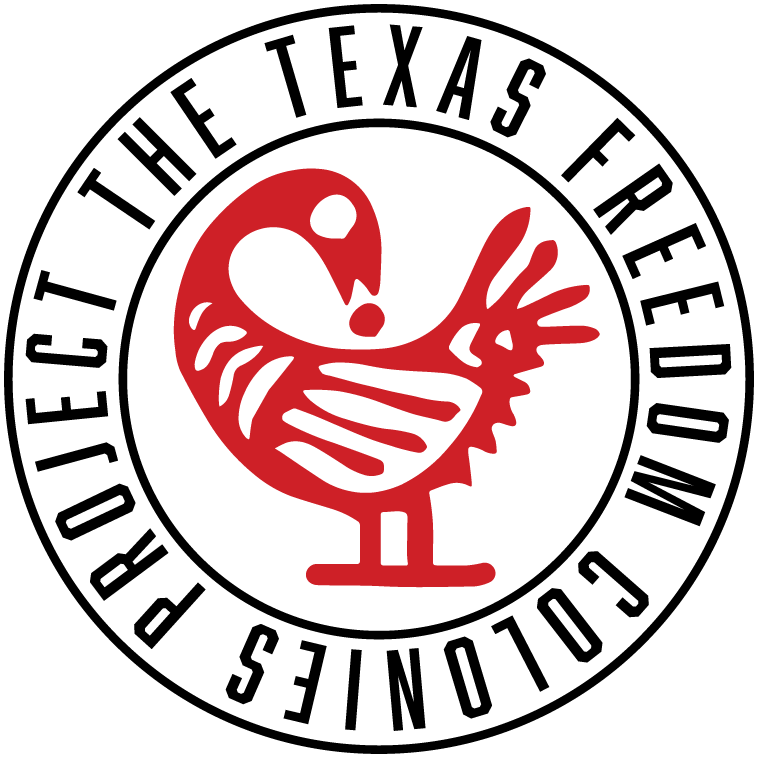
DOWNLOADS AVAILABLE HERE: https://issuu.com/freedomcoloniesproject
The Importance of Oral History
Oral history interviews
- center the voices of freedom colony residents and descendants in the understanding of a place
- fill gaps in the historical record
- are sometimes the only way to learn about aspects of a community
- help ensure that a community’s voice is heard
- help us understand change
- make the invisible visible
The tutorial video and resources on this page will empower you to conduct oral history interviews that enrich public understanding of freedom colonies.
Training Video
This training video, produced from a recording of the Oral Tradition Workshop held on September 5 at the Brenham Heritage Museum, covers the basics of oral history interviews about freedom colony memories, especially the importance of consent and ethics. Oral tradition is inclusive of oral history, as well as songs, stories, and other kinds of information.
Consent and Ethics
Ethically conducting oral history interviews means the interviewer must obtain consent from the interviewee. A written agreement that documents that the interviewee has been given all the information necessary to come to a decision about whether to participate in the oral history project. Download our sample consent form below and fill in the blanks when getting consent from your subjects. Consent means explaining to interviewees:
- the project purpose and process
- If conducting an oral history interview to contribute to this project, you should share the User Agreement with your subject.
- plans for where the oral history interview recording will be stored and used (archiving, public programs, art, film)
- that you know why their story matters
Best practices for conducting an oral history interview:
- Be sensitive to differences; don’t reinforce stereotypes
- Encourage narrators to speak naturally
- Don’t argue
- Make only those promises you can fulfill
- Make your interviews accessible to your narrators and their communities
- If conducting an oral history for The Texas Freedom Colonies Project, you can do that by uploading the interview to the Atlas! Make sure you get consent from your interview subject for their interview to be shared in this way (see above).
What Interview Questions Should I Ask?
There are two types of oral history interviews – topic interview and life review.
Topic Interview – A topic interview is focused on a place, event, organization/institution, occupation, era, art/craft/music, etc. Conduct a topic interview if you’re looking for information on a freedom colony, church, school, or neighborhood. Questions can be drawn from the Black Settlements Study Survey. Write questions that help you:
- Get the facts
- Get the stories
- Get the images and “flavors”
- Get the beliefs and ideas
- Connect to the larger history of a place and events
Use photos, documents, maps, and other materials with your interview subject as prompts for questions and memories.
Life Review: A life review is an overview of someone’s life experiences, usually proceeding chronologically and covering a wide range of topics like family, education, religion, etc. – these are longer interviews that are often conducted over multiple sessions. If you’re interested in conducting a life review, you can learn more about writing questions from Baylor University’s Institute for Oral History or the Smithsonian Institution’s sample questions.
Introduction to Oral History Manual
From Baylor University’s Institute for Oral History, this manual is a helpful primer and reference when conduction oral history interviews. Visit their website to learn more.
Oral History Workshop Manual
From Travis County Historical Commission, this manual is a helpful primer and reference when conducting oral history interviews. The manual was created by Terri Myers and Maria Prieve of Preservation Central and is sponsored by Travis County Historical Commission-CLG and Texas Historical Commission History Stewards.
Travis County Historical Commission Oral History Manual
Recording and Scanning Apps
There are two important types of apps you should have when conducting an oral history interview – a recording app and a scanning app.
Recording Apps: The following recording apps and programs can be used on your phone, tablet, or laptop to record an oral history interview without any special equipment.
- Voice Memo [iPhone] – this app comes with your iPhone or iPad.
- Voice Recorder [Android]
- Smart Recorder [Android]
- Voice Recorder [Windows PC]
- Rev Call Recorder [iPhone] – if you are recording an audio phone call.
- Pixstori [iPhone] – pairs a photo and audio recording.
- Zoom [iPhone, Android, Windows PC] – if you are conducting a remote video interview, you can record your session in Zoom.
Scanner Apps: The following recording apps and programs can be used on your phone, tablet, or laptop to record to capture photos and documents without any special equipment.
- Google PhotoScan [iPhone and Android]
- Adobe Scan [iPhone and Android]
- Microsoft Office Lens [iPhone and Android]
- Tiny Scanner [iPhone and Android]
Practice with your apps and equipment of choice before your interview!
Additional Resources
Since 1966, the Oral History Association (OHA) is an organization that works with policy makers, educators, and other people committed oral history and its preservation. They offer a variety of resources to help foster best practices and encourage support for oral history and oral historians. Use the link below to access their available resources
Oral History Association Resource List
Remote Interviewing Webinar: Sponsored by Baylor University’s Institute for Oral History and the Oral History Association. This timely webinar addressed the dynamics of conducting remote oral history interviews. It begins with an analysis of the pros and cons of conducting distance oral history interviews.
